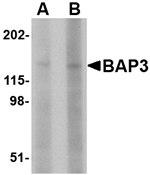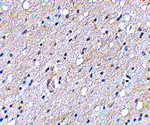BAP3 was initially identified through interaction in a yeast two-hybrid system with the brain-specific angiogenesis inhibitor 1, a p53-target gene that encodes a seven-span transmembrane protein member of the secretin receptor family. BAP3 is predominantly expressed in the brain and possess high homology with Munc13 and synaptotagmin, suggesting that BAP3 may play a role in regulating neurotransmitter release. Recent experiments have shown that BAP3 is induced in certain tumors such as desmoplastic small round cell tumor. Ectopic expression of BAP3 in tumor cells dramatically enhances growth in low serum conditions and colony formation in soft agar, suggesting that the regulated exocytotic pathway may play a role in cancer cell proliferation.


